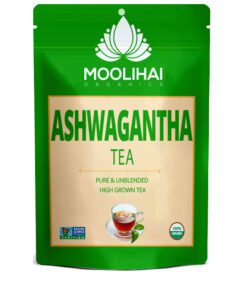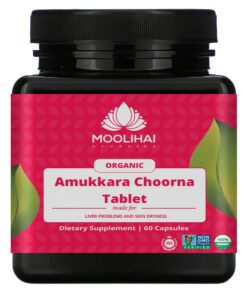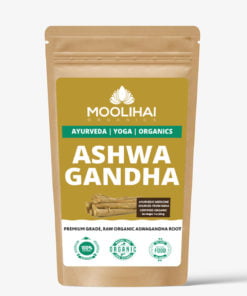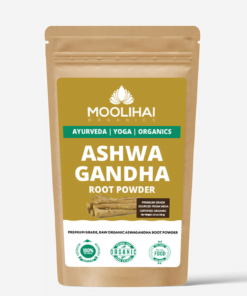Info
Proven Health Benefits of Ashwagandha (Withania Somnifera)

Ashwagandha is a perennial herb that belongs to the botanical genus Withania Somnifera, which has been used for thousands of years in Ayurvedic medicine as a Rasayana for rejuvenating the body. Ashwagandha is a well-known worldwide adaptogenic herb and is the best tonic that helps the body to cope with the psychological and physiological stresses caused by daily lifestyle changes. From ancient times, Ashwagandha has been used by people as a wonderful herb for the active support of various body systems such as the body’s reproductive system, immune system, thyroid system, and fertile tissue.
Common Names of Ashwagandha
Botanical Name: Withania Somnifera
Common Name: Indian Ginseng, Winter Cherry, Ashwagandha
Tamil Name: அமுக்காரன் கிழங்கு / Amukkaram kizangu
Malayalam Name: അശ്വഗന്ധ റൂട്ട് / Amukkuram
Hindi Name : अश्वगंधा जड़ / Asgandh, Punir
Telugu Name: అశ్వగంధ రూట్ / Pennerugadda, Pulivendram
Bengali Name: Asvagandha
Gujarati Name: અશ્વગંધા મૂળ / Aasandha, Ghoda Aakun
Kannada Name: ಅಶ್ವಗಂಧ ಮೂಲ / Ashwagandha, Kiremallina gida
Marathi Name: अश्वगंधा मुळ / Asagandha, Askandha tilli
Urdu Name: اشواگنڈھا جڑ / Asgand
What is Ashwagandha and its History

There is a little funny thing about this Ayurvedic herb which is rich in medicinal properties, that is, “Ashwagandha” is not a Tamil word, it is a Sanskrit word which means “the smell of a horse” (ie, Ashwa means horse, Gandha means perfume). Ashwagandha herb gives you stamina and strength, and it ensures that its horsepower can enrich the male and female nervous and reproductive systems.
The botanical name of this plant is Withania Somnifera, it summarizes all the qualities of this herb: the word Somnifera means “to induce sleep“, which means, Ashwagandha supports deep sleep thus it provides enough energy to the body and reflects a peaceful and relaxed mind in humans.
There are many other names for ashwagandha. As it resembles a berry fruit with red and appears very small, it is also called “Winter Cherry“ or Poison Gooseberry.
Another common name of Ashwagandha is, “Indian Ginseng“. By hearing the name, many would mistakenly think that this herb belongs to the ginseng family. But the truth is, it is not related to the ginseng family, it was named so, because of the plant’s energy-boosting properties.
Ashwagandha – Plant Description

Ashwagandha is an annual perennial herb belonging to the Nightshade and Solanaceae family, which means it belongs to a family of potatoes and tomatoes.
Ashwagandha plants are native to the Middle East, North Africa, and India. Although it is native to these three major countries but is currently being cultivated and used in all temperate countries around the world, including the United States.
The plant is capable of providing maximum capacity for the human body and thrives in all environments such as subsoil, alkaline soil, dry soil, wet soil, temperate and tropical regions. While most of the plants in the tropical environment are affected by severe sunlight, Ashwagandha plants thrive without any damage.
The perennial shrub, Ashwagandha grows up to 3 feet tall. The entire plant is covered with cut hair and is silvery-gray. The branches extend radially from the central stem. Its leaves are oval, dull green, and grow 10-12 cm long.
The plant blooms star-shaped flowers that are yellow-green. It can grow to about half an inch. It produces berry-like fruits that are orange-red when ripe. The red berry fruit of Ashwagandha also has high medicinal value and is enclosed in a papery calyx around its interior to protect the fruit.
Although the berries and leaves of the plant have many valuable medicinal properties, most of its benefits are from the thick roots. The roots are largely used to make medicine.
Ashwagandha Benefits

Ashwagandha is widely used in Ayurvedic medicine because it not only rejuvenates the body but also strengthens, supports, and tones the body functions. One of the wonders of this plant is that they are simultaneously calm and stimulate the body and nervous system. Because of this dual ability, it is widely used in various medicines worldwide. Scientific studies also suggest that ashwagandha is beneficial for certain conditions. Let’s get into those conditions where ashwagandha is useful.
For stress and anxiety
Stress caused by various factors can make the body tired, causing difficulty in sleep and manifesting dangerous “hyper” symptoms in the body. It is found that ashwagandha has a calming effect compared to anxiety medication.
It boosts the body’s ability to control psychological stress, thereby promoting quality sleep at night, and helping to keep the body energized throughout the day.
A study in 2019, in humans, has shown that ashwagandha is effective in reducing anxiety. In this study, researchers separated two groups of people regarding medicine. One set of people was given 250mg of ashwagandha to consume daily, while the other group was given a placebo. Finally, they found that ashwagandha has significantly reduced the levels of cortisol in their body. Cortisol is a hormone responsible for stress and anxiety. Thus this herb helps to overcome stress and anxiety.
Read also: Best Ashwagandha Supplements for Stress Relief
Helps with the Nervous System
Ashwagandha protects you from complex problems, gives the body a nourishing, energizing effect, and ultimately supports a healthy nervous system. The statement that Ashwagandha’s extreme attributes can affect the nervous system is truly contradicted.
That means, if you use this herb or the medicines prepared from this herbal plant, then stress and agitation will go away naturally and cause no harm to your body. Moreover, ashwagandha can make a calming effect on the nervous system and has the quality to cure various ailments throughout the body.
Arthritis
Ashwagandha is boasted of anti-inflammatory properties that act as a pain reliever and help in treating pain. In 2015, a study conducted with 125 people has found that this herb has the potential to treat rheumatoid arthritis. It was effective in people with joint pain.
Read also: Benefits of Ashwagandha for Skin
Good for Heart
Some people believe that ashwagandha helps in boosting your heart health. It lowers your high blood pressure, eases chest pain, maintains the cholesterol level stable, and thus prevents heart diseases. But there is only one research done to support these benefits. In 2015, a study in humans suggested that ashwagandha root extract has helped people in improving their cardiorespiratory endurance. This improves your heart health. But more research is necessary to prove this fact.
Ashwagandha Benefits for Men
Ashwagandha is a natural remedy to improve reproductive health. Research has found that this herb has powerful effects on testosterone levels. It can improve the sperm count in men and thus increase fertility.
A study has been conducted with 75 infertile men, who were given ashwagandha to consume daily. As a result, researchers have found that ashwagandha has increased their sperm count, quality and gave space to fertility. They have also noticed that it has increased the antioxidant levels in their blood.
Another study with men has reported that ashwagandha has relieved their stress factors and thus produced better sperm quality. After 3 months of continuous treatment, the researchers had a shocking surprise. Can you guess what is it? 14% of men who had undergone treatment had shown positive results, that is, their partners had become pregnant.
Overall, ashwagandha is very effective for men in increasing their testosterone levels. Still, what are you waiting for? Try out ashwagandha to improve fertility.
Read more: Health benefits of Ashwagandha for men
Ashwagandha Benefits for Women
Stress plays a vital role in balancing the reproductive hormones. An imbalance in reproductive hormones leads to infertility, libido, and will have trouble in getting pregnant. It can also impact your healthy menstruation.
Ashwagandha’s first role is stress reduction, this closely supports your reproductive health. The dense minerals in ashwagandha improve communication within the endocrine system and help in reducing the cortisol level and strengthening the adrenal glands.
It also helps in the increased production of blood which helps in a healthy menstrual cycle. The regulated hormones and blood flow create a positive effect on libido and thus aids in a fertile window.
In 2015, a study was also conducted to demonstrate how ashwagandha helps females with sexual dysfunction. According to the research, women were given concentrated oral doses of ashwagandha and the result came out with having more orgasms, more satisfying sexual activity, and being stress-free.
If you have a problem with conceiving, then try out ashwagandha, it could light up fertility and help you in balancing your reproductive hormones so that you can become pregnant easily.
Also read: Benefits of Ashwagandha for Hair
Other Benefits of Ashwagandha
Ashwagandha’s natural medicinal properties are greatly supported by its rejuvenating and toning functions, and this plant is an important herb used in various medication preparation. Ashwagandha offers several benefits, which include:
- Increases the body’s immune system and improves health.
- Greatly support the healthy functioning of adrenal glands.
- Develops healthy, deep, and relaxing sleep patterns.
- It supports the healthy growth of muscles and effectively treats musculoskeletal disorders.
- It provides lasting energy, strength, and potential to support the various functions of the body.
- It greatly contributes to a healthy reproductive system for both women and men.
- Reduces stress and calms the psychological process
- Helps to keep the growth of the thyroid glands steady and improve health.
- Supports healthy joints and spine development from children to adults.
Research about Ashwagandha

It is noteworthy that many researchers are interested in learning about Ashwagandha because it is a very popular and diverse medicinal herb. According to their conclusion, Ashwagandha has many rare and proven benefits.
- Radiation therapy or chemotherapy may have some impact on our body’s immune system, and studies have shown that Ashwagandha is effective in protecting the immune system and providing support to those affected people.
- Ashwagandha is used to control the body’s healthy cholesterol levels and boost antioxidant properties. In this process, not only ashwagandha but also Sesame seeds (Sesamum Indicium), Shatavari (Asparagus Racemosus), licorice (Glycyrrhiza Glabra), Safed Musli (Chlorophytum Borivillanum) are all included.
- Studies about Ashwagandha were highly concentrated on the stress-free effects of this plant. The study concluded that the plant’s adaptogenic properties effectively reduce both psychological and physiological stresses and support brain functions.
- The group formed to investigate the reproductive traits of Ashwagandha used male participants for this experiment. This ensures that the strength, energy, and vitality required for reproduction are enhanced by the ability of the Ashwagandha.
- In addition, the Ashwagandha plant has been proven to be supportive of muscle mass and recovery as well as it provides sustained medication or diet to the body.
Various studies on Ashwagandha have been conducted and have been successful. Although the above are very few, many other studies have been published on the websites. Discover more out there.
Studies about Ashwagandha were highly concentrated on the stress-free effects of this plant.
Ashwagandha Uses

Ashwagandha is still considered a versatile herb beyond our belief. This herb used in ancient times as a mere leaf form can be eaten today in various forms, such as tablets, liquids, and powders, or combined with food.
And unlike other medicines, it can be consumed at any time of the day, such as in the morning, at night, before or after meals. The extract and powder of this plant are very tasty and it is easy to combine with food, and many delicious recipes are using Ashwagandha.
Although Ashwagandha has a variety of medical merits and is suitable for all ages, it is advisable to consult a doctor at least once to consume it. If you want to use Ashwagandha traditionally, you need to keep the leaves of the plant well dried in the extreme sunlight and then grind them down into a powder.
Mixing this powder with water or honey or hot milk and consuming it before bed can effectively calm the Vata. Regular intake of this combination supports the reproductive system, enhancing the strength of the body, and leading to healthier sleep patterns.
Consuming equal amounts of honey or ghee along with ashwagandha increases the overall nutrient content of the body and provides a refreshing feel. These herbs serve as an ideal medium for transporting nutrients to even deeper areas of tissue.
Combining equal quantities of honey and ghee with a teaspoon of ashwagandha powder is considered toxic, so make sure they are not of equal weight. The use of raw sugar as a substitute for honey during the summer can also be beneficial.
Mixing Ashwagandha with raw sugar is used to keep the reproductive system healthy, especially in women, and to treat problems associated with joints.
Ashwagandha Tonic Recipe
Ingredients :
- Ashwagandha powder – 1 to 2 teaspoons
- Milk – 2 cups
- Raw sugar – 1 tablespoon
- Cardamom – ⅛ teaspoon
Procedure: Boil 1 or 2 teaspoons of Ashwagandha powder in 2 cups milk at low heat for about 15 minutes. Exactly 15 minutes later, add ⅛ teaspoon cardamom and 1 teaspoon of raw sugar to the content and mix well, turn off the stove after two minutes. Drinking this tonic once or twice a day for a cup will cure most of the ailments and you can feel refreshed.
Ashwagandha Tea Recipe
Ingredients :
- Ashwagandha powder – ½ teaspoon
- Hot water – 1 cup
- Honey – 1 teaspoon
Procedure: Making tea is a much easier process than making a tonic using ashwagandha. Take ½ teaspoon of Ashwagandha powder, add it to the hot water and then mix well. In a few minutes, the ashwagandha extracts will be mixed with water. You can then add 1 teaspoon of honey to taste. Unlike other coffee or teas, this Ashwagandha tea has no chicory and is a good rejuvenating and refreshing booster for the body.
Read more: Health benefits of Ashwagandha Tea
Ashwagandha Rearing System
Not only when buying products, but also when buying a plant or seeds to rear it, one should consider the value, quality, cost, reliability of the company, and its impact on the environment. And there are some steps from buying seeds to planting them properly, growing them, and making their products great.
Where is Ashwagandha Grown
Ashwagandha, native to India, is widely cultivated in tropical and subtropical, and arid regions, as it does not require much water. Ashwagandha is widely cultivated in the arid regions of the southwestern Indian region of North Karnataka. In addition, they are grown in Indian states like Haryana, Rajasthan, Gujarat, Punjab, Maharashtra, Uttar Pradesh, and Madhya Pradesh.
Due to the limited selection of crops and the harsh agricultural environment, farmers in these areas are not having the facility of irrigation, and as I have already stated, the Ashwagandha plant does not need much water and maintenance to grow in such areas.
How to Maintain the Ashwagandha Plant from Seed to Harvest
You should first make sure that the seeds of the Ashwagandha you are sowing are certified. Also, before planting this certified organic ashwagandha, you should make sure that your land is certified organic because both seed quality and soil quality play an important role here.
To avoid the use of pesticides, synthetic fertilizers, and other harmful chemicals, all your farming methods must meet strict organic regulations.
Well, let’s talk about growing seeds. The quality of the final product of an herb varies depending on the location and manner of cultivation. This means that farming or fielding can have a significant impact on your spending.
They are often sown at the beginning of the rainy season, though less water is required for ashwagandha. After five months, the plant reaches maturity and will be harvested. Growing plants spaced out in the fields determines its shape, root thickness, and fiber at harvest time.
If the seedlings are harvested ahead of time or planted too closely, their growth may be incomplete, and the yield may be poor.
The distance between the seedlings must be precise, perhaps if they are too far apart or delayed harvesting of the plant will produce a thick fiber root, which can present a variety of challenges when trying to produce a balanced powder.
Sustainability in Action & Fair Trade
Sustainable planting and proper harvesting are an important part of Ashwagandha’s rearing systems. Ashwagandha herb is grown and harvested on farms, usually in cold climates and high rainfall areas, and such companies grow it based on a specific selection method.
Sustainability can be easily and accurately managed by harvesting in the farms. Harvesting in natural habitats or field areas also provides some degree of sustainability. The main threat to sustainability is that sometimes herbal plants and herbal trees are illegally taken out of the wild and sold into the market, and illegal acts like this threaten long-term sustainability.
The whole process of cultivating ashwagandha is certainly not possible without the care and attention of the farmers. Unlike the plants that grow in the wild, along the highways, the wonderful and high-quality ashwagandha that grow in the care of farmers are the ones used to make great medicines and are exported heavily.









Ponnatharam Stone (Raw) | For Permanent Hair Removal
Vengai Paal | Black Bindi | Dhrishti Pottu | Vengai Pottu for Babies | 100% Natural
Dried Avaram Senna Flower / Cassia Senna Auriculata / Aavaram Poo / Tarwar / Amaltas Leaves / Senna Auriculata / Avaram Poo / Sanay / Alexandrina / Tanner’s Cassia flower
Natural Dried Moringa Flower – Moringa Oleifera – Drumstick Tree Flower – Murungai Poo – Munagaku Flower
Akasa Garudan Kilangu / Redfruit Creeper / Corallocarpus Epigaeus
Original Edible Camphor | Pacha Karpooram | Bhimseni Camphor
Pure Ponnatharam Powder For Hair Removal
Saussurea Obvallata Seeds / Brahmakamal Seeds / Queen of the night / Sacred Saussurea Kon Kapfu / Brahma Kamalam / Nishagandha
Insulin Leaf Powder / Chamaecostus Cuspidatus / Costus Pictus / Spiral Ginger / Insulin Powder / Costus Igneus
Kaunch Beej Powder |Poonaikali | Velvet Bean Powder | Mucuna Pruriens | Kapikacchu | Natural Nervine Tonic & Muscle Builder
Achu Pottu for Babies | Bindi Mould Set | Baby Seratta – 1 Set
Aalam Pazham / Banyan Fruit Powder / Ficus Benghalensis / Marri Palu / Bargad / Dodda Alada Mara / Peraal / Vat Vriksha Powder